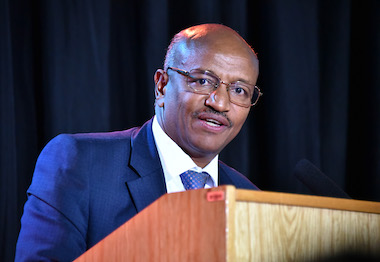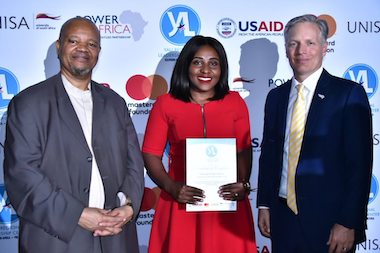On Wednesday afternoon, 17 April, dignitaries, development agencies and academics gathered together at Unisa for the official launch of the Young Africa Leaders Initiative (YALI) AFRICA and to witness the certification ceremony of 37 young African women leaders who were selected from across Africa to take part in the YALI Women in African Power (WiAP) programme. The programme is presented by the YALI Regional Learning Centre Southern Africa, hosted at the Unisa Graduate School of Business Leadership (SBL).

Ambassador, Extraordinary and Plenipotentiary of the Federal Democratic Republic of Ethiopia, His Excellency Dr Shiferaw Teklemariam
Dignitaries and guests assembled, representing 48 African countries with speakers including the Ambassador, Extraordinary and Plenipotentiary of the Federal Democratic Republic of Ethiopia, His Excellency Dr Shiferaw Teklemariam; Principal and Vice-Chancellor of Unisa, Professor Mandla Makhanya; Dr Shola Safo-Doudu, Chief of Party of the YALI Regional Leadership Centre in West Africa (Accra); Ms Rebecca Krzywda, the Deputy Mission Director: USAID, Southern Africa; and Mr Richard Nelson, Deputy Coordinator of Power Africa.
The Young African Leaders Initiative is a signature effort by the United States Government to invest in the next generation of African leaders as they catalyse change in their communities, countries, and continent. The YALI Regional Leadership Centers (RLCs), based in Ghana, Kenya, Senegal, and South Africa, identify potential in and empower young people ages 18-35 from diverse backgrounds across the continent. Funded by USAID, the Mastercard Foundation and Dow Chemical, the YALI programme focuses on three tracks, namely, public management and governance, business and entrepreneurship development, and civic leadership.
The four Regional Leadership Centers have worked closely over the past four years to set themselves up as sustainable institutions. YALI AFRICA launches as an umbrella body that will harness the collective power of the four RLCs and develop them into long-standing, sustainable institutions. YALI AFRICA will form the central point of connection that will support the setting and maintaining of a shared mandate and unified vision, the development of universal curriculum standards, and the mobilisation of joint resources, public presentation and branding.
Ms Cristal Peterson, Deputy-Director: Communication and Marketing at the SBL and the Progamme Director for the evening, said in opening the launch and graduation ceremony that the event was a milestone in what has been an iconic partnership between Unisa, as the host institution for the Regional Leadership Center Southern Africa and its partners. The Regional Leadership Center Southern Africa alone has graduated a total of 3,514 participants since inception in 2015.
Of the Women in African Power programme, Ms Peterson said, “The 37 graduates who formed cohort 2 of the four-week programme were selected from a pool of more than 1,000 participants, indicating a great need for this type of initiative. On the African continent, women make up between 20 and 25 percent of the workforce in the overall energy sector, with a marked under-representation of women in high-level decision-making positions. The Women in African Power programme endeavours support the career development of a new generation of women leaders in the energy sector, who have the opportunity to change the gender-biased narrative.”
In his opening address, Professor Mandla Makhanya, Principal and Vice-Chancellor of Unisa said, “In terms of the gender split in Africa, women are outpacing men, but when viewing employment statistics particularly in leadership and senior positions, a very different picture emerges where men dominate.”
Professor Makhanya described the current state of the population in Africa saying, “As much as 41% of the population is under the age of 15, with the median age at 18. A number of reputable bodies predict that our continent’s population will reach 2.4 billion by 2050. By 2100 more than half of the world’s growth is expected to have come from Africa, with a population reaching 4.1 billion people and accounting for one third of the world’s population.
“The active working-age population, between 25 and 64 years, has grown more rapidly than any other age group from 33 per cent (or 123.7 million) in 1980 to 36.2 percent (425.7 million) in 2015.”
In light of this picture, Professor Makhanya said that the continent urgently requires young, well-trained people across all spheres, and this is where YALI’s regional centres have had, and will continue to have, an important role to play. “The YALI purpose will now be boosted significantly through YALI AFRICA. At Unisa, we are firmly geared to the future and committed to playing our role in this process. Through YALI we are fundamentally growing visionaries, with partners who share our goals and vision of being the African university in service to humanity.”
Speaking on behalf of YALI AFRICA, Chief of Party for YALI RLC West Africa (Accra), Dr Shola Safo-Doudu, recalled that merely 18 months previously the chiefs of all four regional centres had met in Ghana to discuss the issue of RLC sustainability beyond 2019. She said, “It has been an incredible journey of collaboration, partnership and team work. Today we are excited that the concept of a YALI AFRICA has moved from thought and ideas to reality before our eyes. Importantly, YALI AFRICA will be the fund-raising vehicle for the centres. Our focus is to build on YALI’s success by ensuring that more opportunities are available for young Africans from all corners of the African continent.”
Ms Rebecca Krzywda, the Deputy Mission Director: USAID, Southern Africa, said of the programme, “At USAID, our goal is to make sure that our programmes become self-reliant. In YALI’s RLCs, we have seen exactly what we hoped to see. The four regional centres have given rise to rich partnerships. We know that 13,000 young African leaders have gone through the YALI programme consisting of a promising, diverse group of innovators and self-starters. Our opinion is that YALI AFRICA has chosen the right moment to launch.”

Principal and Vice-Chancellor of Unisa, Professor Mandla Makhanya and Deputy Coordinator of Power Africa, Mr Richard Nelson. With them on the picture is one of the recipients, Temwani Chirwa from Zambia.
Mr Richard Nelson, Deputy Coordinator: Power Africa, which is the USAID project that funded the Women in Power programme, congratulated the 37 graduates of cohort 2 of the programme. He said, “The qualities that our Women in Power programme graduates displayed when going through the application process have been very present throughout the duration of the programme. They are intelligent, curious, collaborative and fearless risk takers. These qualities are what is needed in business to pitch innovative solutions, challenge entrenched ideas or push for that promotion.”
Mr Nelson highlighted the fact that Power Africa’s investment in women across Africa was not undertaken simply because it was a nice thing to do. “It is because we truly believe that when women have leadership roles in business and other sectors, those organisations perform better. A strong correlation suggests that this is true. Research has revealed that businesses with women in positions of seniority have an operating profit 20% higher than the industry average. Currently in Africa, as little as 5% of CEOs are women. Research also indicates gender parity brings higher revenue, a lower gender pay gap and greater participation.”
His Excellency, Dr Shiferaw Teklemariam, Ambassador, Extraordinary and Plenitpotentiary of the Federal Democratic Republic of Ethiopia, delivered the keynote address during which he stated that the work that YALI has done in the continent to bring young leaders together has been phenomenal. He said: “The ability to collaborate and work together across the continent really offers new hope for all of us. It demonstrates that with commitment and passion we can indeed as a collective achieve more.”
As a message to the certificate recipients, His Excellency, Dr Teklemariam, urged the young women graduates to practice what they had learned in the Women in Power programme. He said, “Africa requires responsible exploitation of our natural resources along with a strong commitment to peace and development. We look to leaders such as yourselves to rise up to the challenge, bringing much needed solutions to the problems confronting us. The positive impact of leadership can set our continent on a path that leads to greater opportunities.” He outlined Ethiopia’s commitment and progress to achieving gender equality, citing the country’s appointment of its first women president Sahle-Work Zewde in 2018 and the fact that 10 out of 20 cabinet ministers are women.
In closing the event, Ms Peterson said, “At Unisa and the SBL we will continue our efforts to ensure that those glass ceilings that prevent women and other marginalised groupings from reaching the higher echelons are well and truly shattered.”
Publish date: 2019-04-24 00:00:00.0
Contact the Marketing and Communication office: Mr Aubrey Louw at louwwa@unisa.ac.za
011 652 0365
Telephone: +27 11 652 0248 / +27 11 652 0291
Email: sbl@unisa.ac.za
Physical Address:
Cnr Janadel and Alexandra Avenues
Midrand, 1686
Gauteng, South Africa
Download map & directions (PDF)